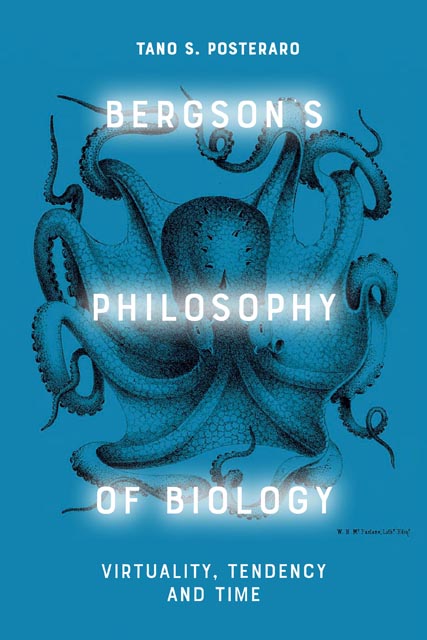Book contents
- Frontmatter
- Contents
- Acknowledgements
- Abbreviations
- Introduction: Between Philosophy and Biology
- 1 The Actual: Mechanism, Finalism, Modality
- 2 The Virtual: Instantiation, Implication, Dynamics
- 3 A Discourse on Tendency
- 4 Individuality and Organisation
- 5 Finalism Inverted
- 6 Canalisation and Convergence
- Concluding Remarks and Future Directions
- Notes
- Bibliography
- Index
4 - Individuality and Organisation
Published online by Cambridge University Press: 25 October 2023
- Frontmatter
- Contents
- Acknowledgements
- Abbreviations
- Introduction: Between Philosophy and Biology
- 1 The Actual: Mechanism, Finalism, Modality
- 2 The Virtual: Instantiation, Implication, Dynamics
- 3 A Discourse on Tendency
- 4 Individuality and Organisation
- 5 Finalism Inverted
- 6 Canalisation and Convergence
- Concluding Remarks and Future Directions
- Notes
- Bibliography
- Index
Summary
This chapter reconsiders Bergson's views on space and time on the basis of his metaphysics of tendency. Space and time are reified abstractions from spatialisation and temporalisation processes. Life and matter are not categories under which any actual entities could fall, but principles that define a set of conflicting tendencies towards time and space. All that exist in fact are composites formed out of the configuration of these tendencies under differing relationships of predominance and subordination. Organised material systems are typified by the tendency towards time. The élan vital is an image for the individuating activity of the temporalising tendency.
Introduction
Bergson seems to accept a basic duality between life and matter when he defines life as ‘a tendency to act on inert matter’ (CE 96). Life is action that ‘always presents, to some extent, the character of contingency; it implies at least a rudiment of choice’ (CE 96). Matter is the medium for the activity of life. Without life's ‘effort to engraft on to the necessity of physical forces the largest possible amount of indetermination’, matter is inert, unorganised, its behaviour determined by laws (CE 114). When Bergson makes claims like these, he is speaking abstractly. There is no such thing as fully inert matter on the one hand, absolutely extended in a homogeneous space, set against completely liberated forms of life on the other, wholly free from the causal laws governing physicochemical forces. Life and matter are principles abstracted from tendencies. Tendencies can be oriented towards time or space. Time and space refer to opposite directions on a continuum. To tend towards time is for something to tend to emphasise the efficacy of time, which is manifest in processes such as self-organisation and the interpenetration of parts in a developmental whole. To tend towards space is for something to tend to approximate the abstract ideality of a geometrical grid on which its parts can be isolated, localised, and modelled deterministically. Life itself exists on its own no more than inert matter. To refer to life that way involves two operations of abstraction. It involves an abstraction of fully realised states – of self-organising individuality, interpenetration, and indetermination – from the tendency towards their processual development. It involves an abstraction of this tendency from the material systems in which it is embodied at some degree of realisation, in conflict with the tendency towards space as well.
- Type
- Chapter
- Information
- Bergson's Philosophy of BiologyVirtuality, Tendency and Time, pp. 132 - 173Publisher: Edinburgh University PressPrint publication year: 2022



